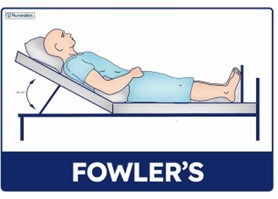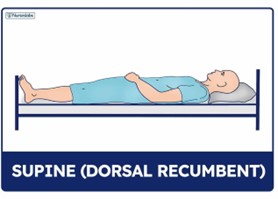While in the dining room at the hospital, the nurse notes a visitor has forceful coughs. Which actions would the nurse take to assist this visitor?
Select all that apply:
Start cardiopulmonary resuscitation (CPR).
Assist the client to a sitting position on the floor.
Allow the visitor to cough.
Assess for a weak ineffective cough.
Perform the Heimlich maneuver.
Correct Answer : C,D
If a visitor in the dining room at the hospital has a forceful cough, the nurse should first allow the visitor to continue coughing. Coughing is a natural reflex that helps clear the airway of foreign objects or mucus. The nurse should also assess the effectiveness of the cough. If the cough is weak or ineffective, further intervention may be necessary.
Starting cardiopulmonary resuscitation (CPR) or performing the Heimlich maneuver would only be appropriate if the visitor is choking and unable to breathe. Assisting the client to a sitting position on the floor may not be necessary and could potentially cause harm.
Nursing Test Bank
Naxlex Comprehensive Predictor Exams
Related Questions
Correct Answer is A
Explanation
The best way to increase the client's motivation to learn is by encouraging their participation each time the procedure is performed. This can help the client feel more involved in their own care and increase their confidence in performing the procedure. The other options (Offering to do the procedure for the client each time it is scheduled, Teaching the client's support system how to perform the procedure, and Demonstrating the finger stick procedure to the nurse) may not be as effective in increasing the client's motivation to learn.
Correct Answer is A
Explanation
This statement indicates a need for further teaching because it is not accurate. Positioning a client in good body alignment and changing the position regularly are essential aspects of nursing practice, but the position should be changed more frequently than every 3 hours. It is generally recommended to reposition clients at least every 2 hours to prevent pressure ulcers and other complications. The other options (Frequent change in position helps to prevent muscle discomfort, undue pressure resulting in pressure ulcers, damage to superficial nerves and blood vessels, and contractures; Any position, correct or incorrect, can be detrimental if maintained for a prolonged period; and For all clients, it is important to assess the skin and provide skin care before and after a position change) are accurate statements and do not indicate a need for further teaching.


Whether you are a student looking to ace your exams or a practicing nurse seeking to enhance your expertise , our nursing education contents will empower you with the confidence and competence to make a difference in the lives of patients and become a respected leader in the healthcare field.
Visit Naxlex, invest in your future and unlock endless possibilities with our unparalleled nursing education contents today
Report Wrong Answer on the Current Question
Do you disagree with the answer? If yes, what is your expected answer? Explain.
Kindly be descriptive with the issue you are facing.
